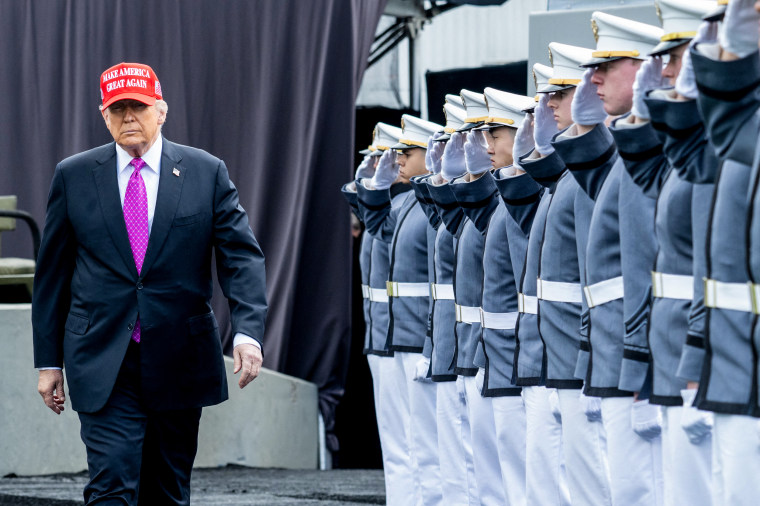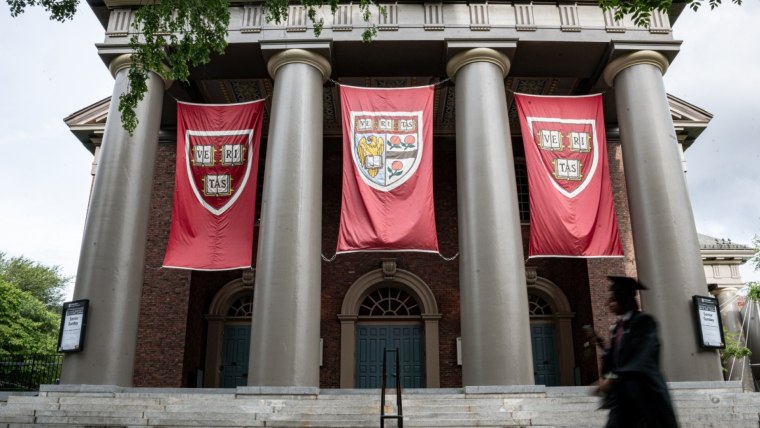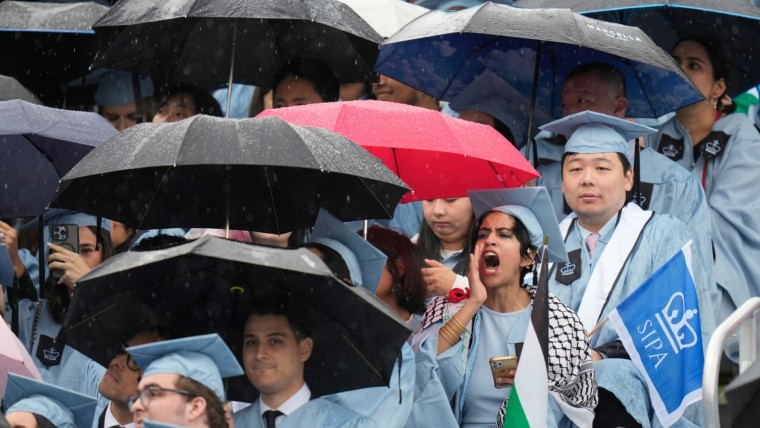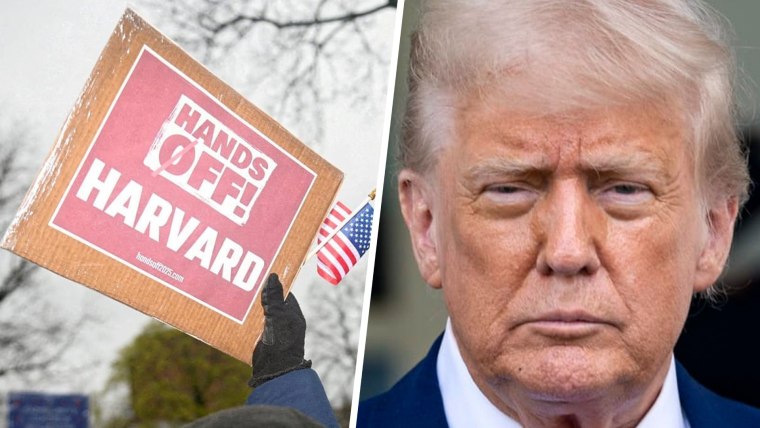You’ve heard of Generation X, Gen Y and Gen Z. The current crop of graduates in America could well be dubbed “Gen T” because they’ve spent much of their lives under the shadow of Donald Trump. For the last three presidential cycles, he has been the often caustic commander in chief or the campaigner denying his election loss, and there’s no doubt he will leave a mark on a generation of young adults who have watched him smash norms, stoke division, seek retribution and ignore the Constitution and the rule of law.
We witnessed the president’s disregard for norms during his commencement address at West Point.
We witnessed the president’s disregard for norms Saturday during his commencement address to the graduating class at the U.S. Military Academy at West Point while wearing a red Make America Great Again ball cap and delivering a speech that was more appropriate for a partisan political rally.
But let’s be clear, Trump’s MAGA hat was maybe the least offensive thing about his maundering one-hour speech at the formal and typically somber West Point commencement. In a bizarre campaign-style avalanche of words that was disrespectful to the cadets and their families, he rambled about trophy wives and yachts and expressed a distasteful zeal for butchering one’s enemies while addressing the men and women poised to become the next generation of leaders in the world’s mightiest military.
It wasn’t that he didn’t understand the assignment. He delivered the West Point commencement address in 2020 in a brisk 25-minute speech that focused on duty and even national unity, talking about the “long gray line” of the institution’s history. His world outlook and his leadership style have changed and along with it the futures of the graduates at West Point and everywhere else, regardless of their political leanings.
Perhaps no group of “Gen T” graduates knows that better than those at Harvard, who’ll be participating in commencement Thursday as the president escalates his feud with America’s oldest and most storied university. The Trump administration has frozen billions of dollars in federal research grants for Harvard, attempted to ban the university from enrolling international students and threatened to revoke its tax-exempt status, and it has directed federal agencies to cut any remaining ties to the school. The administration accuses Harvard of tolerating an antisemitic atmosphere on campus, and some conservatives have more broadly described Harvard as an incubator for aggressive liberal ideology. Harvard, for its part, is fighting back in court.

The president has floated the idea of redirecting Harvard’s federal funding toward trade and technical schools, which may play well with working-class voters, but Trump’s team has said little about what it would do to fill the gap in health, technology, scientific or geophysical research that takes place at universities like Harvard. Railing against academic elites is red meat, but cancer research benefits people in red states as well as blue states. Not only that, but people who work in factories building ships and cars or who farm soybeans in the middle of the country are often using technologies that emerged from research labs at elite universities.
This year’s graduates form the most diverse cohort this country has ever produced. But they are walking into a world where the very word “diversity” has been demonized and weaponized to cauterize the civil rights and human rights gains that should have been their true inheritance.
The word “diversity” has been demonized and weaponized to cauterize the civil rights and human rights gains that should have been their true inheritance
The young people who remember the racial reckoning that followed the murder of George Floyd are graduating at a moment when the Trump administration has swiftly dismantled diversity, equity and inclusion initiatives under the claim that DEI discriminates against white people. A claim codified under executive order with absolutely no proof.
“They came through K through 12 where they learned these lessons about how you treat other people and to be accepting and how we were supposed to treat people that were different from us,” said Tressie McMillan Cottom, a professor at the University of North Carolina-Chapel Hill and a New York Times columnist, “only to arrive in college and find out that not only was that not the reality, but the very things they have been taught to value now makes them targets in their own country, either because they are those people, they embody those identities and those lived experiences or because they sympathize or empathize with those people.”
McMillan Cottom, who spoke to me as I guest-hosted MSNBC's “Last Word” last Friday, continued: “So there’s a sense of loss of trust, not just between generations, but I think between young people and what they think is possible for them in the United States of America. And frankly, that is heartbreaking.”

McMillan Cottom notes that “internet culture” set the stage by helping to destabilize “the norms of what was acceptable discourse” and then Trump-style politics helped show them “if you can get away with it, then it is normal, which ... is an absolute horrible way for social cohesion to work.”
This season’s graduates are marching into adulthood on new terrain and on their own terms. But on the way there, they did what young people generally do — look to adults for guidance about guardrails and decorum. And what did they see?
Adults cheered a man making fun of disabled people and looked the other way when he talked about grabbing women by their private parts. In November, they saw a majority of those who voted accept and elevate a man who was twice impeached and convicted of 34 felony counts. And, since then, they’ve seen too many adults remain silent as an administration smashes constitutional guarantees of due process and lectures about the need for merit-based ideologies while appointing a litany of Cabinet officials who are manifestly underqualified but unquestionably loyal.
Here’s wishing all who are graduating the best of luck.
Trump made significant inroads with young voters in the last election, especially college-age men. There has been a lot of analysis concerning why younger voters gravitated in his direction, but not enough about the impact his leadership will have on young people’s psyches or their prospects in life.
For not only are the graduates marching across stages this spring walking into a world where the norms have been upended, but they’re strutting into an uncertain job market and a tumultuous economy.
They and their aging baby boomer and Gen X parents are less likely than generations past, for example, to have solid health care or benefit from researched-based medical advancements.

It has become clear that the real goal of this administration’s chain saw approach to federal programs is not to cut waste, fraud and abuse but to provide more tax cuts for ultrawealthy Americans, an approach that will do nothing little to gild the futures of everyday American kids.
Here’s wishing all who are graduating, from universities, trade schools, military academies, community colleges and high schools, the best of luck. Given all the changes Trump is enacting, the path may be steeper for some than it otherwise would be. But sometimes it’s easier to find one’s footing when charging uphill. I hope this class discovers their best selves and creates a brand of leadership that combines courage and grit with compassion and curiosity. And I pray the adults that are presently in charge find a way to provide the opportunities in life that they all deserve.
This column includes an adapted excerpt from the May 23 episode of “The Last Word.”

